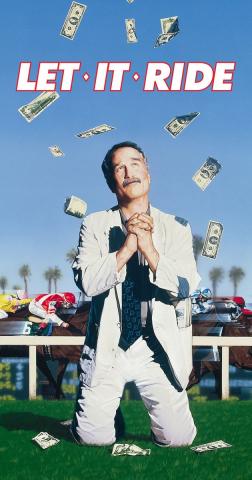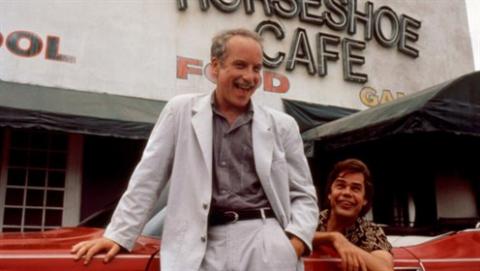
Stars of Yesterday: Looking Back at the Best Rebel Stakes Winners

Longtime ESPN horse racing columnist and Oklahoma-based author/journalist Jay Cronley died on Feb. 26, 2017. Cronley was the author of seven books, including "Funny Farm" and "Quick Change," which were made into movies that starred Chevy Chase and Bill Murray, respectively. But for passionate horse racing fans, Cronley is best-remembered as the witty author whose novel "Good Vibes" was made into the sport's cult classic "Let It Ride."
Sometimes you might be walking around lucky and not even know it.
A trite gambler’s maxim? Perhaps. Jay Cronley seemed to think so. In the film he co-wrote, “Let It Ride,” it’s literally right out of a fortune cookie. It also functions as the central theme of the film. Gamblers must never give up gambling, it seems, because if they don’t make a bet every day they might miss out on their big moment.
It is in this moment, their walking around lucky moment, that every bet they place is a winner, everything they do is right, everything breaks in their favor for once. Give up gambling and your moment may pass you by without you ever knowing.

This is the reasoning of a sick, degenerate mind. And so we have Trotter, the protagonist of “Let It Ride” — a hapless, frumpled, grouch of a man who drives a taxi by night and gambles on horses by day. He reads his fortune cookie at dinner with his seriously at wits’ end wife in the opening scene shortly after pledging to her that he will stop gambling. And he means it when he says it. But the next day he ends up at the track and, in his words, has “a very good day.”
“Let It Ride” was not a great movie. Despite reuniting the stars of “Close Encounters of the Third Kind,” Richard Dreyfuss and Terri Garr, and casting former iconic punk frontman Buster Poindexter in the supporting role (not to mention Jennifer Tilly and Cynthia Nixon in smaller roles), the film wasn’t a big hit. It opened in 1,191 theaters and went straight to video in many markets when it came out in August 1989. The director of the film, Joe Pytka, had never done any feature work before, having previously only directed commercials for Pepsi (including the infamous Michael Jackson hair-burning ad). One of the writers, Nancy Dowd, had her name taken off the film and chose to be credited under the pseudonym Ernest Morton. The music is awkward and jarring, like it was lifted from a different movie. A lot of the jokes are massive groaners. And the plot, a schmoe who wins every bet he makes (and can’t make a losing bet no matter how hard he tries) is pure fantasy.
Yet “Let It Ride” is at the same time a very good movie. And for many fans of horse racing, “Let It Ride” is the greatest horse-racing movie ever made. Not because it is funny, although it certainly has its moments. And not because it is dramatic, although there are scenes that so perfectly capture the tension and drama of sweating a big wager you’d think it was a documentary. It’s because “Let It Ride” is perhaps the only horse-racing movie ever made that looks to capture the point of view of the punter, the handicapper, the horse race gambler. It’s not so much a story about horses or even racing as it is a story about betting on horse races. And for the vast majority of fans of the sport, that is how we experience it.
Horsemen dream of having a horse that has the talent to win the Kentucky Derby. We dream about having a good day. We dream about walking around lucky and actually knowing it. This is our dream. This is our story.
“Let It Ride” is based on Jay Cronley ’s 1978 novel “Good Vibes”. Long out of print, today copies of “Good Vibes” sell on the second-hand market for hundreds and hundreds of dollars. It’s a testament to how popular and canonized “Let It Ride” has become to horse racing fans through the years.
For my part, “Let It Ride” is required viewing whenever preparing for a big weekend at the races or a road trip to a big race. It has held up over dozens and dozens of repeated viewings. Despite the corny jokes and a few clunky performances, what holds my attention is Trotter, Richard Dreyfuss’ pitch-perfect performance as a gambler completely spellbound by his own good fortune. He’s in a zone. And as he moves through the racetrack, soaking up the newfound respect and admiration that winners are afforded and losers envy from afar, he is Carey Grant. He stands in for all of us. He is the everyman.

Trotter is about to bet on a loser, a horse touted to him by a sultry blonde in The Jockey Club, and can’t. He is dragged away kicking and screaming by security. When the horse loses, Trotter realizes that he is in the throes of something supernatural. He begins betting with confidence because he reads the signs the universe is giving him, like looking into a horse’s cloudy, magical eye. He realizes the universe is his silent partner and with that knowledge, he cannot lose. He surrenders to it and at every turn he is rewarded with good fortune.
Even though there’s a mystical thing happening in the movie and we always know (and Trotter also knows) that he will not lose a bet, you still feel the anxiety before each race is run, or as he sweats a photo finish. It doesn’t matter that we know he will win. We feel the palpable tension because we’ve felt it before. To any real horse race gambler, that feeling is as familiar as family. Summoning it back up requires little suggestion.
Just take this scene, easily the film’s finest moment, where Trotter shares a moment with the teller at the $50 minimum window. By the seventh race, Trotter has run up his $100 stake into $2,400 and is convinced he can’t lose. He takes a survey of people at the track and eliminates every horse they tout him. Only one horse is left, the 25-to-1 Fleet Dreams. He asks the teller for 48 $50 win tickets.
The teller asks “are you sure you don’t want to hold a little back, just in case?”
“In case what?” Trotter snaps.
“In case you get hungry or thirsty before the end of the race!”
Here, Trotter has found a comrade, someone who understands. Trotter shows the teller a pocketful of change, the teller nods, and then this happens:
If you felt a little mist in the corners of your eyes, then friend I am your brother. Maybe it wasn’t with $2,400 on the line, but you’ve been there before and so have I. One day may we find ourselves there together. And when we do, I really hope you win.